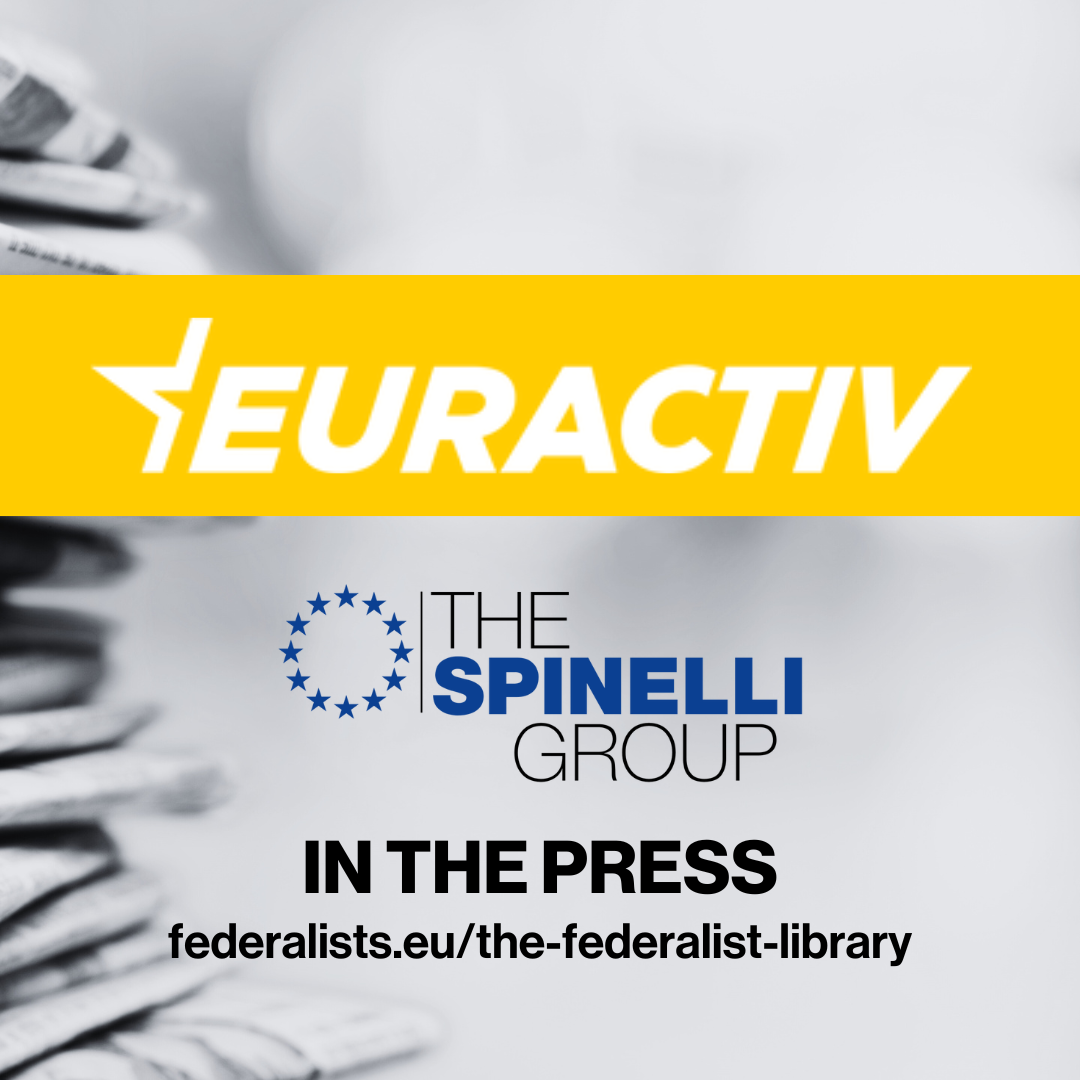
EURACTIV Italy interviewed Lukas Mandl, MEP of the European People’s Party, president of the Austrian section of the European Union of Federalists, recently appointed president of the Spinelli Group, which brings together federalist MEPs.
What are the main objectives of the Spinelli Group in this legislature?
I can only speak for the beginning of the legislature, since, as you know, we have a rotation system for the chairmanship of the federalist parliamentary group called the Spinelli Group. It is an honour, but first and foremost it is a mission to chair this Group. The objective can only be the reform of the European Union. Thinking big is what we ask of the members of the Spinelli Group. And what we recommend to our colleagues in the European Parliament, as well as to all other EU institutions, including the Member States. To think big, to have more leadership, a more visionary approach to achieving EU reform.
I would like to draw attention to the fact that we have now passed the longest period in the history of the European Union without a new treaty. The Lisbon Treaty was the last one in 2008. We had no reform while the world was changing so much. We also have the longest period in EU history without a new accession. The last one was more than 10 years ago, that of Croatia in 2013. But one country, the United Kingdom, has left the EU. There are at least two facts, two figures – no treaty reform and no membership for the longest period – that must encourage us to visionary leadership to work on EU reform.
Leadership means serving. Leadership also comes with responsibility. The term ‘responsibility’ includes the word ‘respond’. To be able to respond to people’s concerns. Because people’s concerns are present in every single member state. Maybe in different ways, but in every member state there are concerns about the EU. In the capitals of the member states, in the governments of the member states, there is a risk assessment that leads to fears about treaty reform. Because there is fear that the situation will get worse. But fear is never a good attitude to deal with any kind of activity. We have to overcome this fear. We must take into account the risk assessment and work so that the situation does not get worse, but better.
Last but not least, President Emmanuel Macron is completely right when he says that the EU can also die. Memento Mori (remember you must die) is an absolute pillar of European intellectual history. And of course it also applies to the EU itself. Stating this does not mean wanting it, but on the contrary it means demanding a serious approach, as I have just tried to emphasise. What I really appreciate about the Spinelli group is that we draw attention to these main tasks and work together in a multi-party and transnational way. This will also be central to the success of the Spinelli Group.
After two and a half years of war in Europe, the EU is still far from a European defence. We still pay twice as much for energy as the US and China. According to the Letta and Draghi reports we are 800 billion investment short (20% must be public) needed to implement green and digital transitions and ensure a European defence. How can the EU overcome this?
The Letta and Draghi reports provide us with an excellent outline of the challenges and possible tools to solve the problems. Both reports can also be part of the Spinelli Group’s policies for this term. Secondly, we must not stop halfway. I have a lot of confidence and that is why I voted for Ursula von der Leyen again for a second term. I know and take the concerns of the people very seriously, because I have to represent the citizens. I voted for her again to ensure stability and because I believe she will not stop halfway when it comes to defence. As you have just pointed out, we must continue to strengthen Europe’s defence capabilities – which, as you know, we started with the war of aggression against Russia. We must continue to do so. For the first time we will have a defence commissioner. At the very first meeting of the Spinelli Council, several members of various groups expressed the wish to invite the new Defence Commissioner, Andrius Kubilius, to one of the first meetings of the Spinelli Group at the beginning of the mandate. And in all the other areas you have just mentioned, leadership and responsibility, also understood as responsiveness, will be important. This is what the Spinelli Group will recommend and also politically demand from the EU institutions.
Yesterday the patriots had the upper hand, voting amendments to the budget resolution with the EPP and then voting against the whole resolution with the S&D and the Greens. Since the Spinelli Group includes MEPs from all pro-European parties, can it play a role in helping Ursula’s pro-European majority to remain united and keep the nationalist groups at bay?
Yesterday’s less than pro-European behaviour was not the vote on transparency and accountability of humanitarian aid and funding in the Palestinian territories. Because that was the issue. It is a clear pro-European approach to transparency and careful handling of taxpayers’ money. The problem with not being very pro-European was to vote against the report in its entirety. This should not have happened. But I respect this democratic result and emphasise it. There is no doubt that the European People’s Party is pro-European – but I don’t really like the expression because there is no possibility of being anti-European; that would be schizophrenic. But so are the other groups represented in the Spinelli group, precisely because of their pro-European approach. Of course, the Spinelli group is part of the glue that unites the pro-European groups. It does not matter that the vote in the European Parliament can never be predicted in its entirety. Voting dynamics are part of parliamentarianism and those who respect democracy also respect these voting dynamics.
The Spinelli Group played an important role in the drafting of the proposal for treaty reform approved by the European Parliament in November 2023. Are you going to relaunch this initiative to put pressure on the European Council to convene a Convention? What can we learn from the fact that the European Council did not even put Parliament’s Treaty reform proposal on the agenda? Is Parliament’s power of initiative to amend the Treaties jeopardised or at risk by the European Council’s ignoring Article 48 TEU?
I think we have to do both at the same time. On the one hand, we have to think big and demand leadership and a visionary approach. On the other hand, we have to deal with the existing structures, which do not grant the European Parliament the power that would be appropriate for a directly elected Parliament. Of course we must ask the governments of the member states to convene a Convention. But we must also ask them what they are waiting for. That is, what else needs to happen to start the EU reform process, which will take many years anyway. On the other hand, we have to take seriously the risk assessment of member state governments and address their concerns to try to persuade them. And never stop talking – that is the speciality of parliamentarians. This is what we should also do vis-à-vis Member State governments to overcome their fear. Fear is never a good counsellor. Overcoming fear and having a visionary approach to the Convention will be our recommendation.
How can we overcome the fear of the risk of failure, considering the outcome of 2005 on the Constitutional Treaty (when referendums in France and the Netherlands voted against ratification and caused the Constitutional Treaty to fail, even though other referendums were in favour and the majority of European citizens who voted in a referendum were in favour of ratification)? How can we possibly avoid a similar fate for the next treaty reform?
I believe that it cannot be 100% avoided. But the example of 2005 and the subsequent Lisbon Treaty shows that the EU is capable of standing up if it is forced to do so. The Lisbon Treaty would not have been successful without the problem of creating a European Constitution. We keep running. The positive, constructive, visionary and unifying approach has always won in the end. This does not mean that Macron is wrong. He is right: the EU can also fail. But as long as we keep running, we will not let it fail. The example of 2005 is negative. But it is also positive because it shows that there is always meaning and significance in continuing to run, to try and to get back up after falling.
